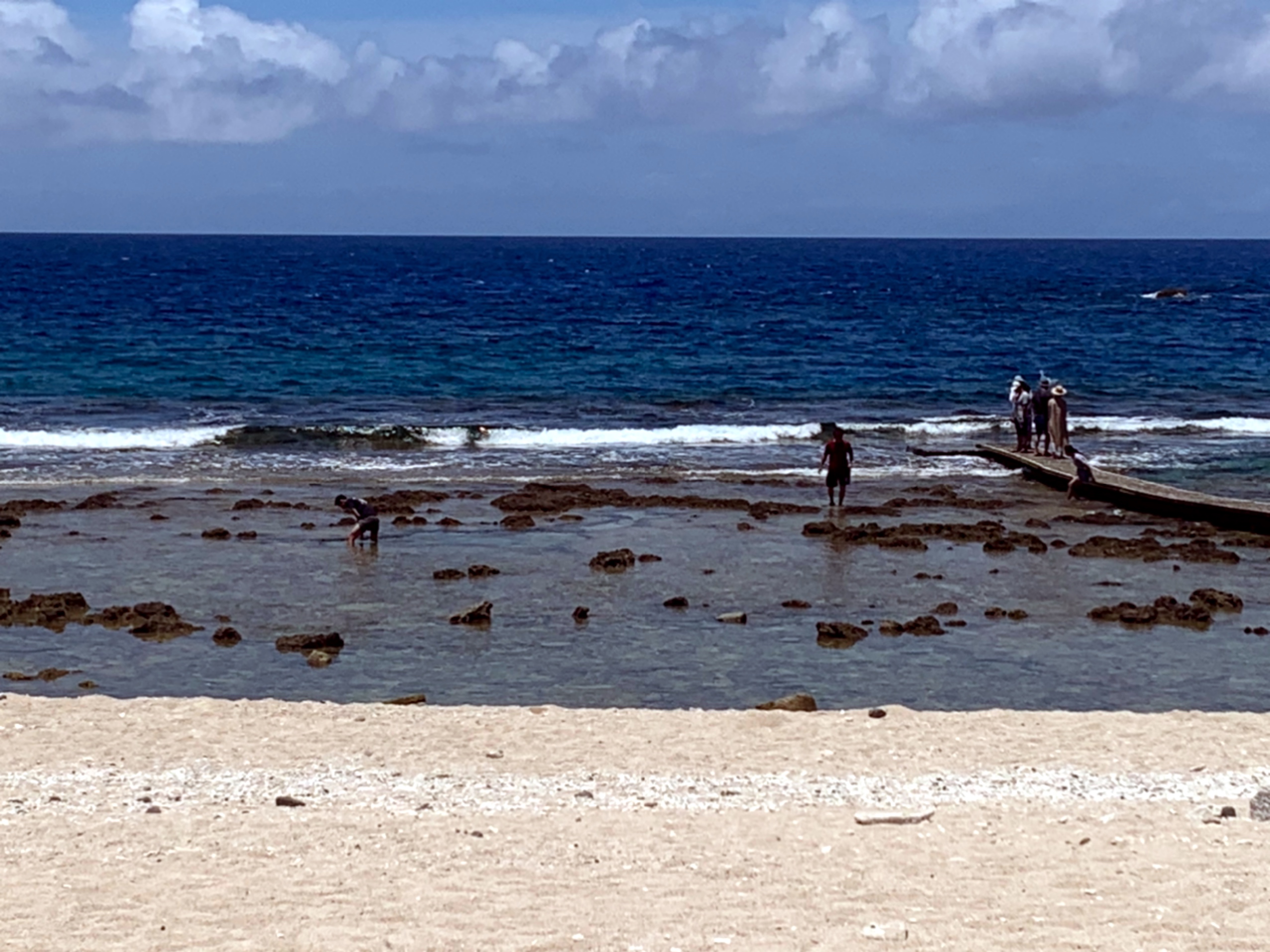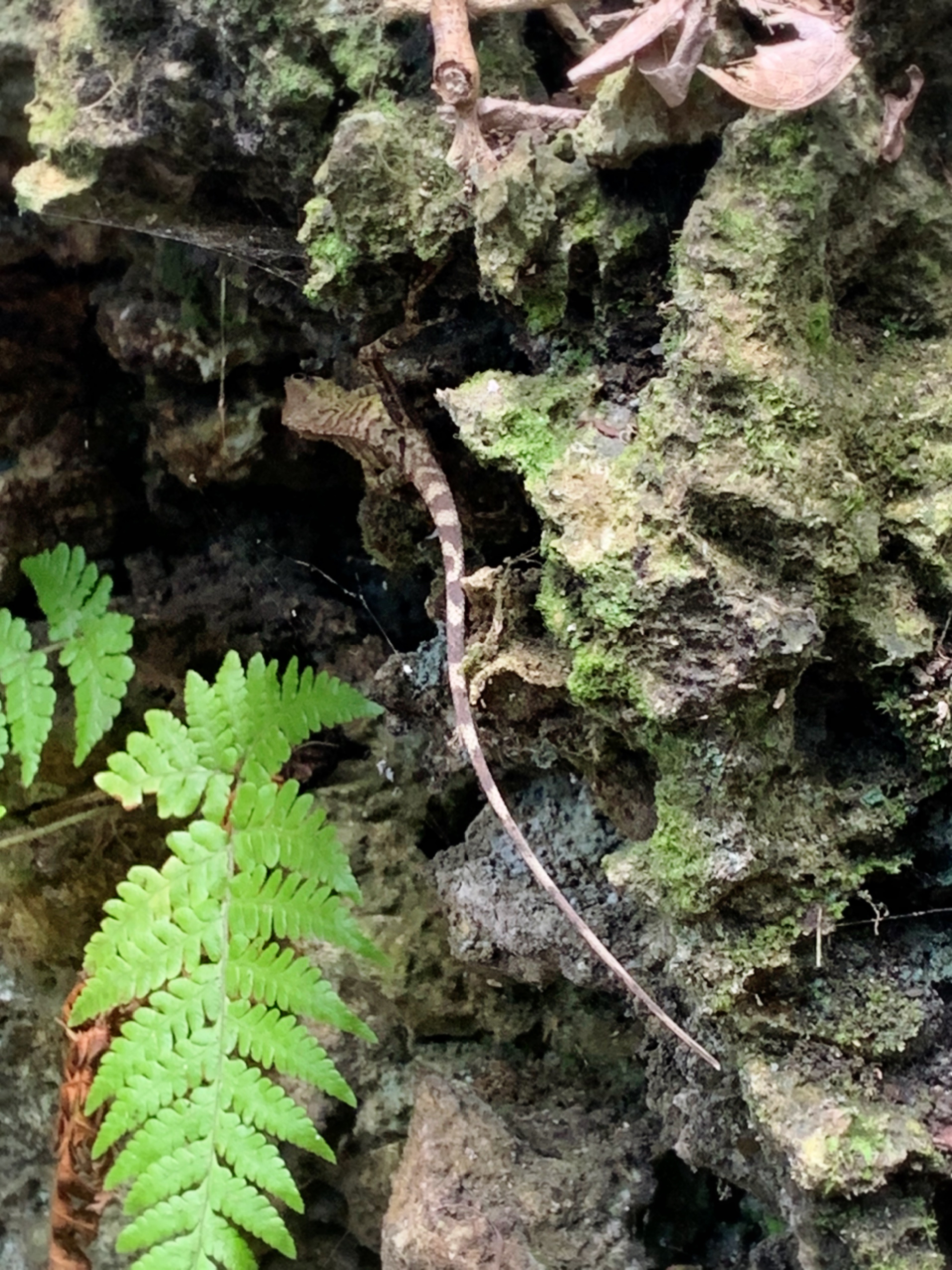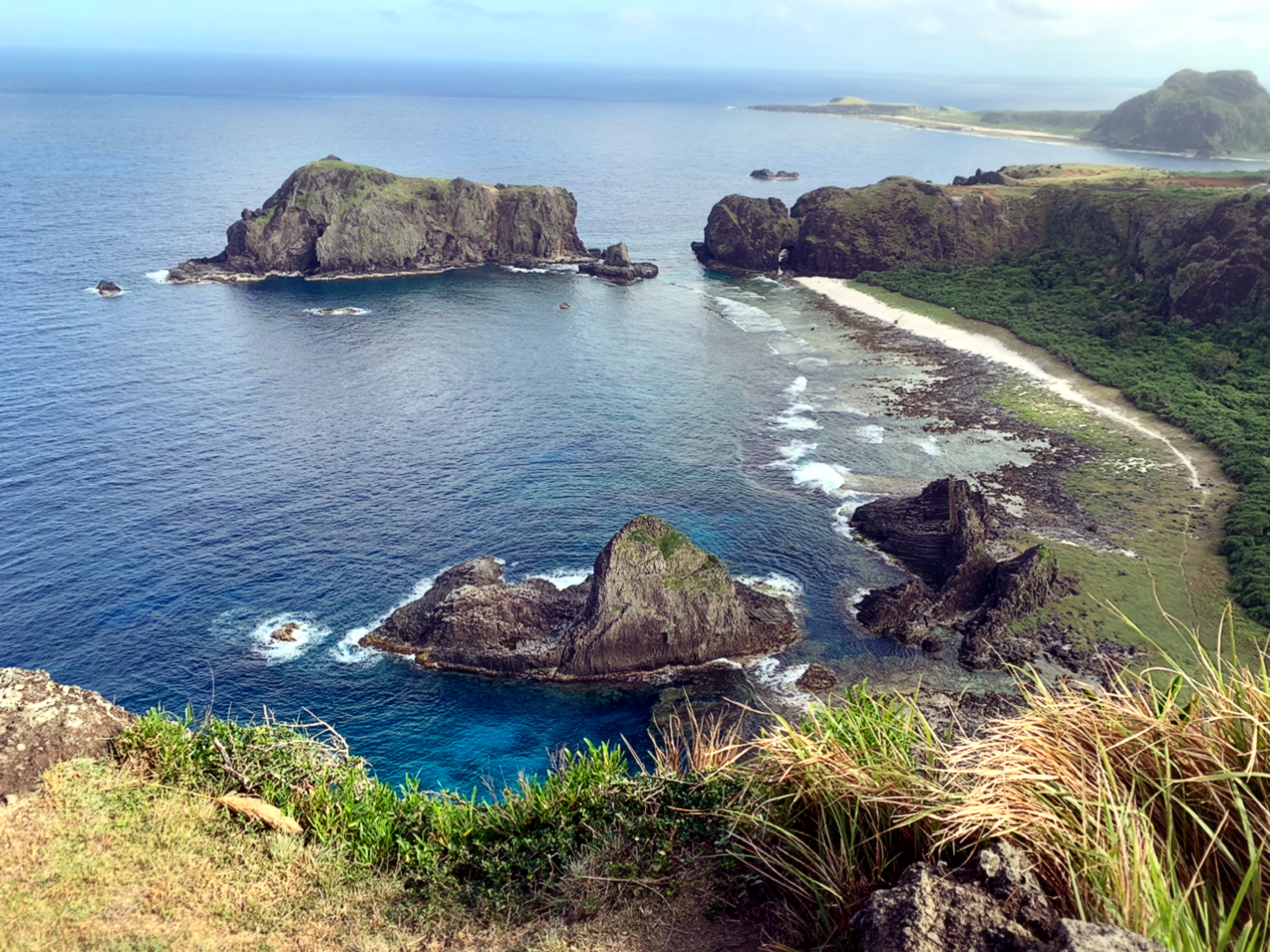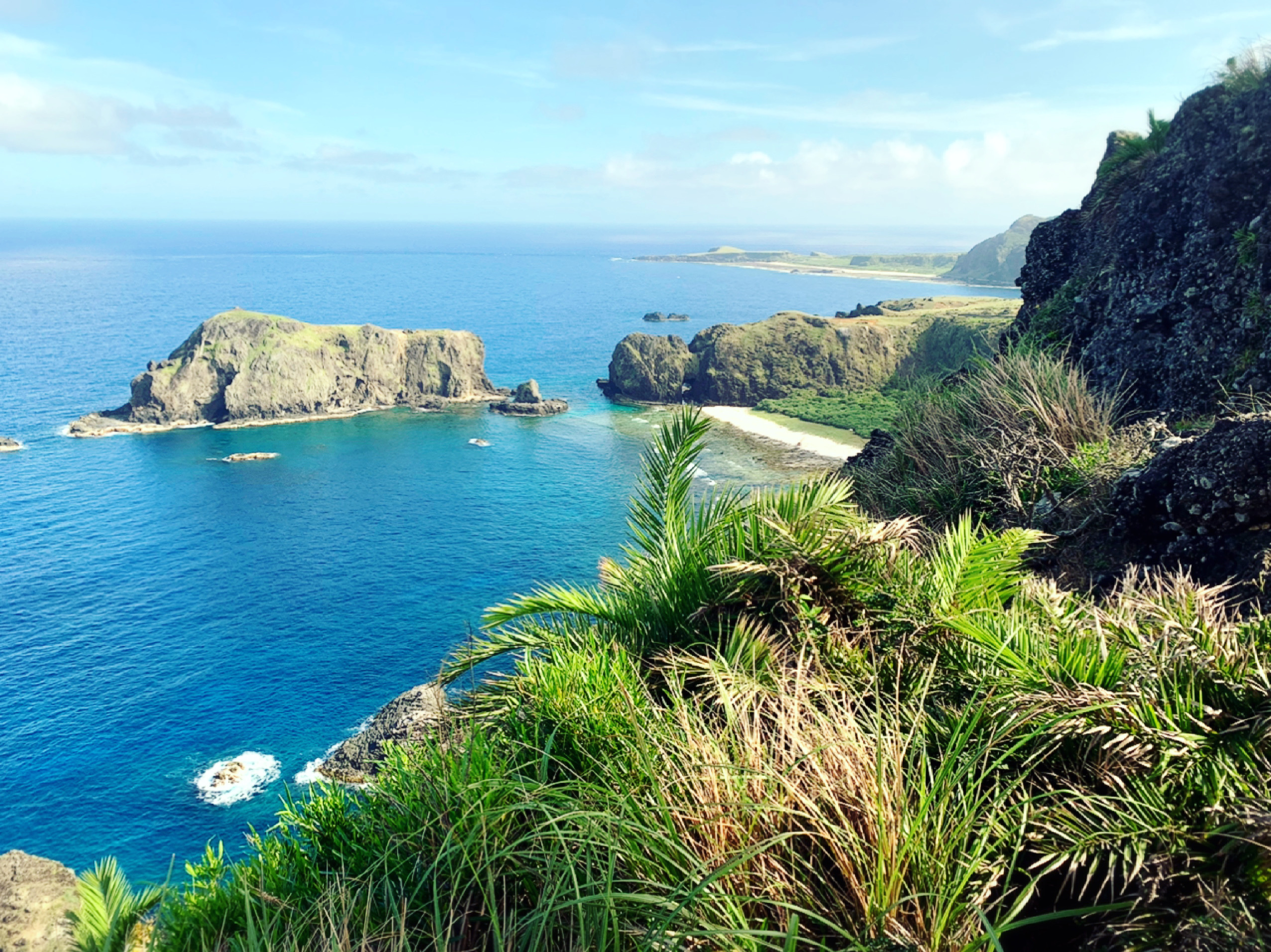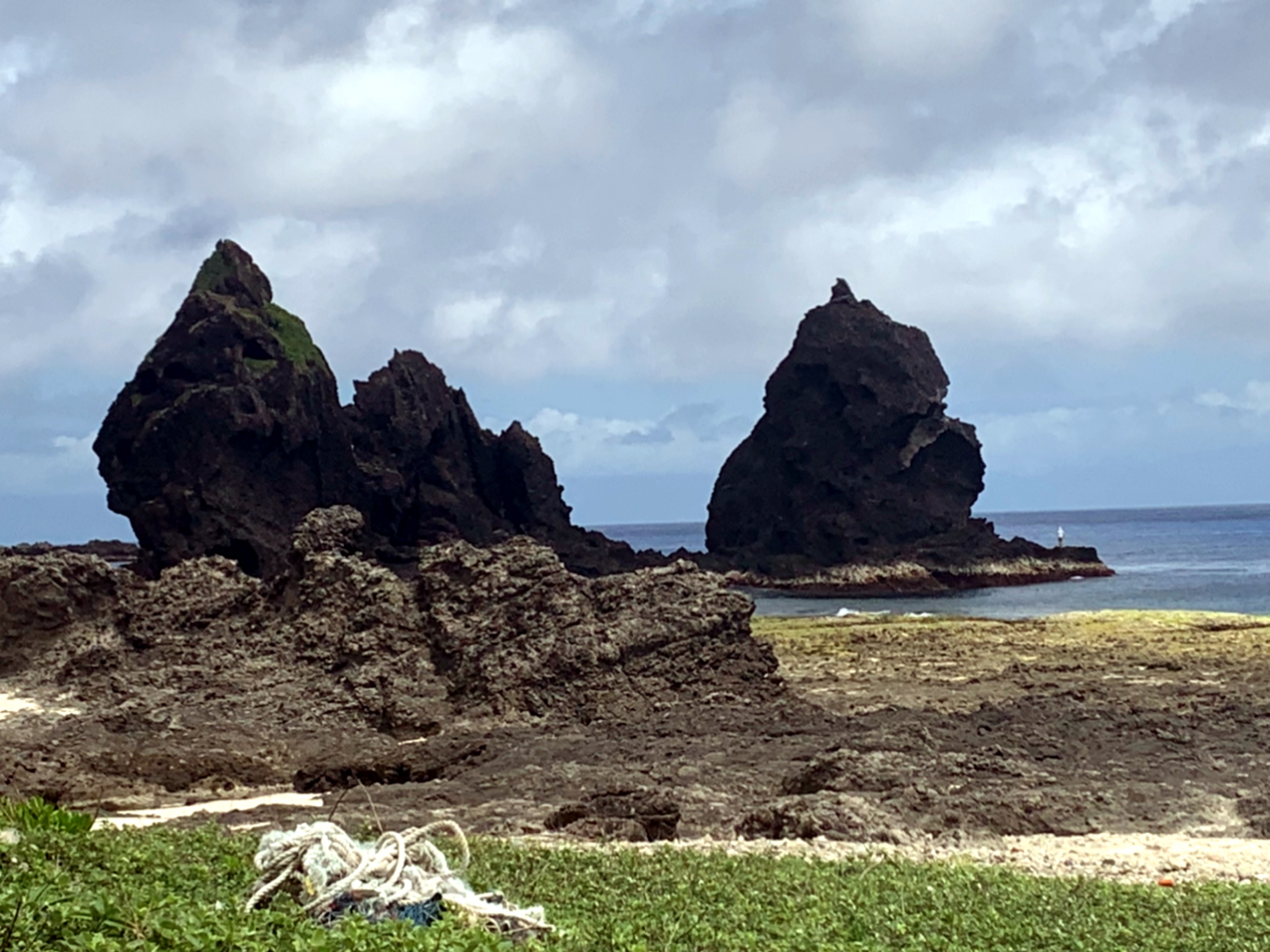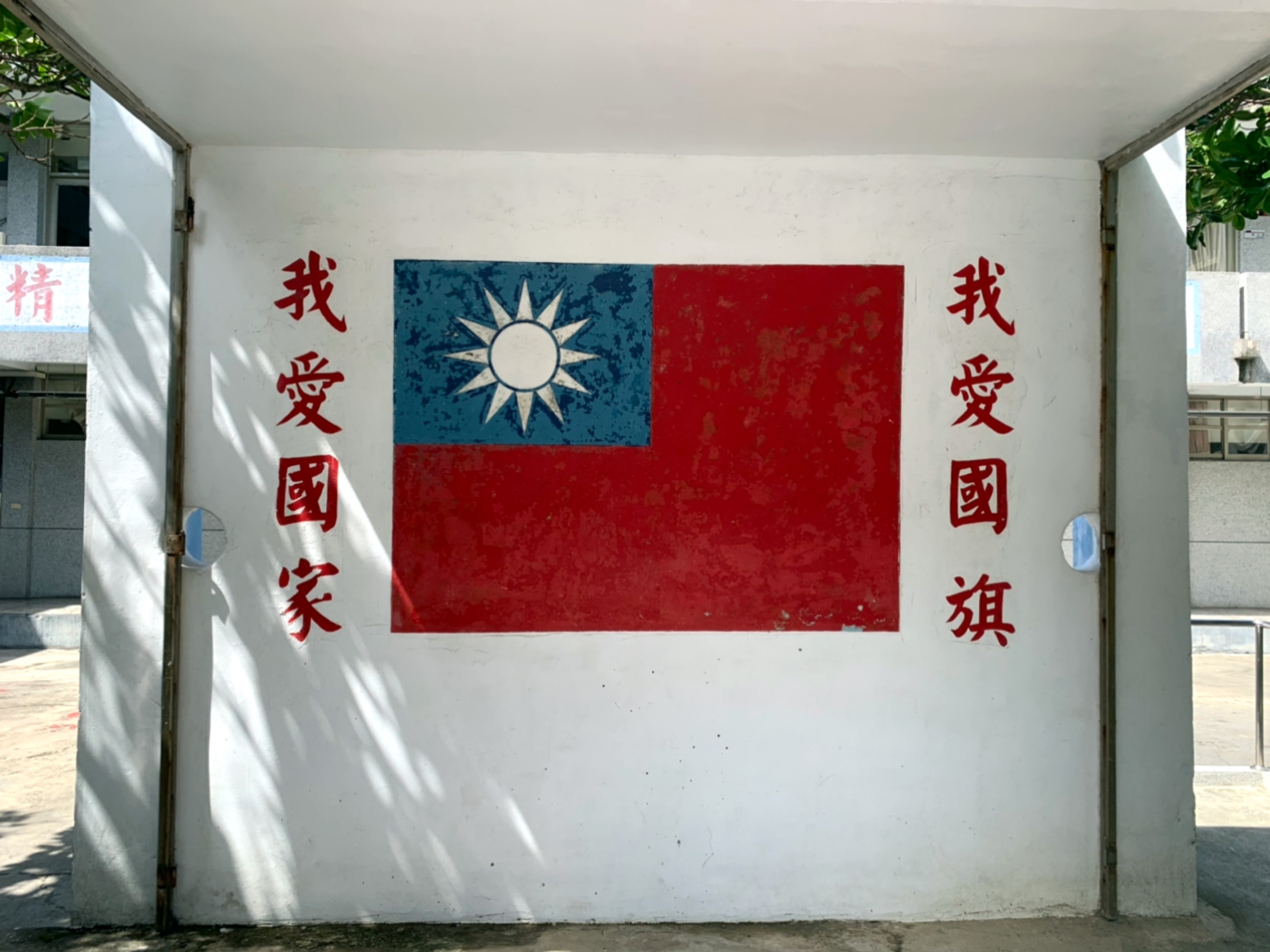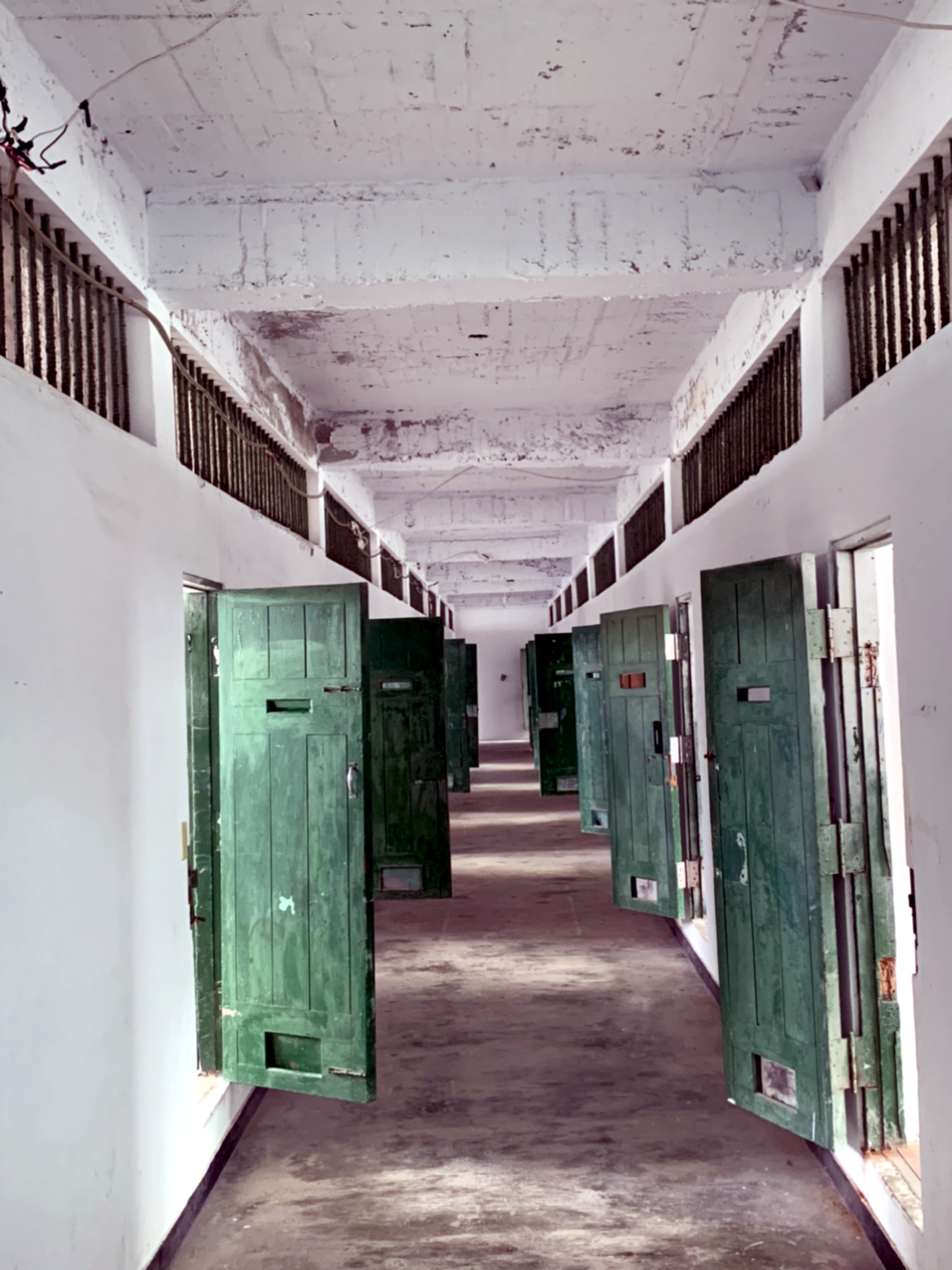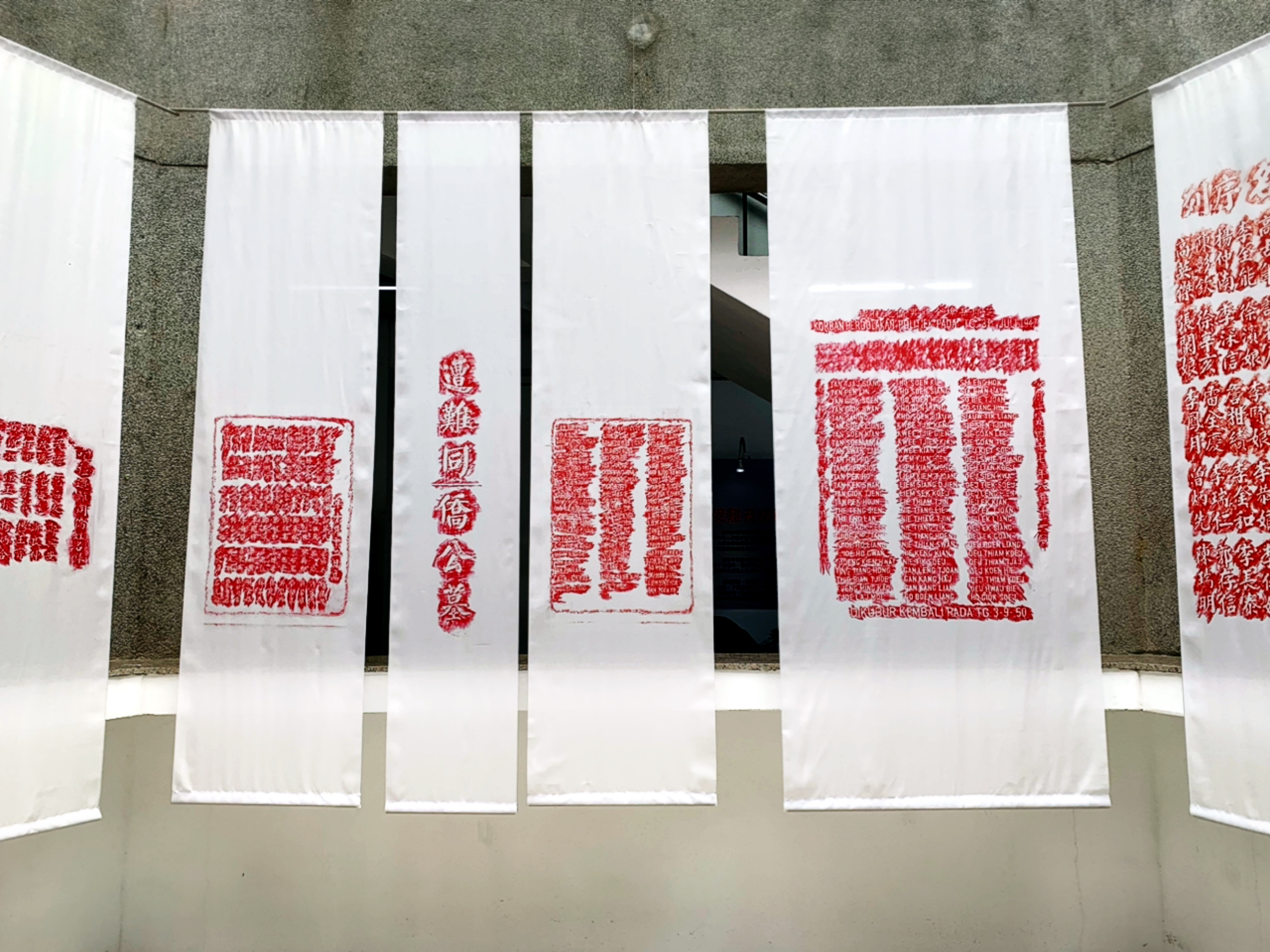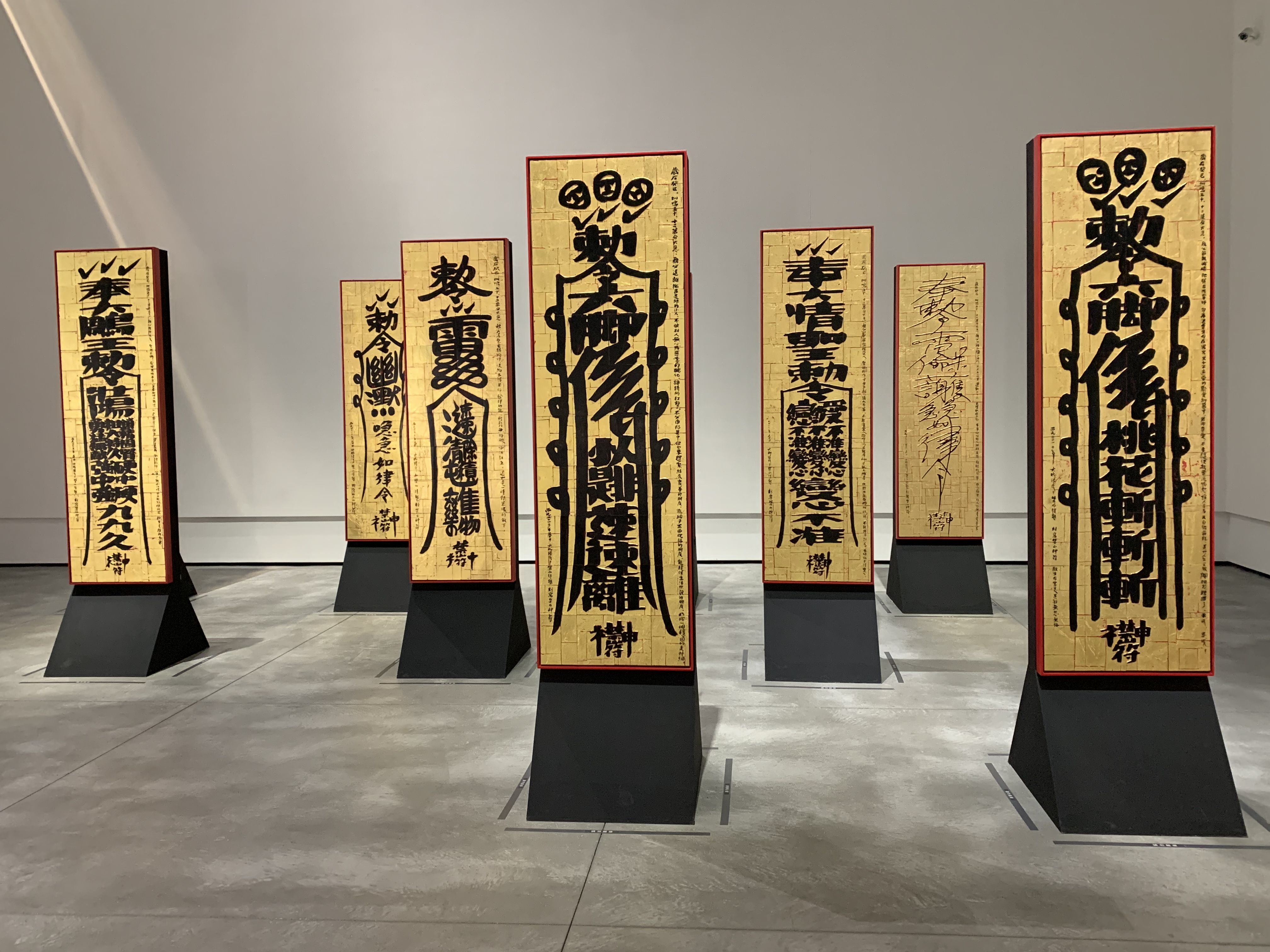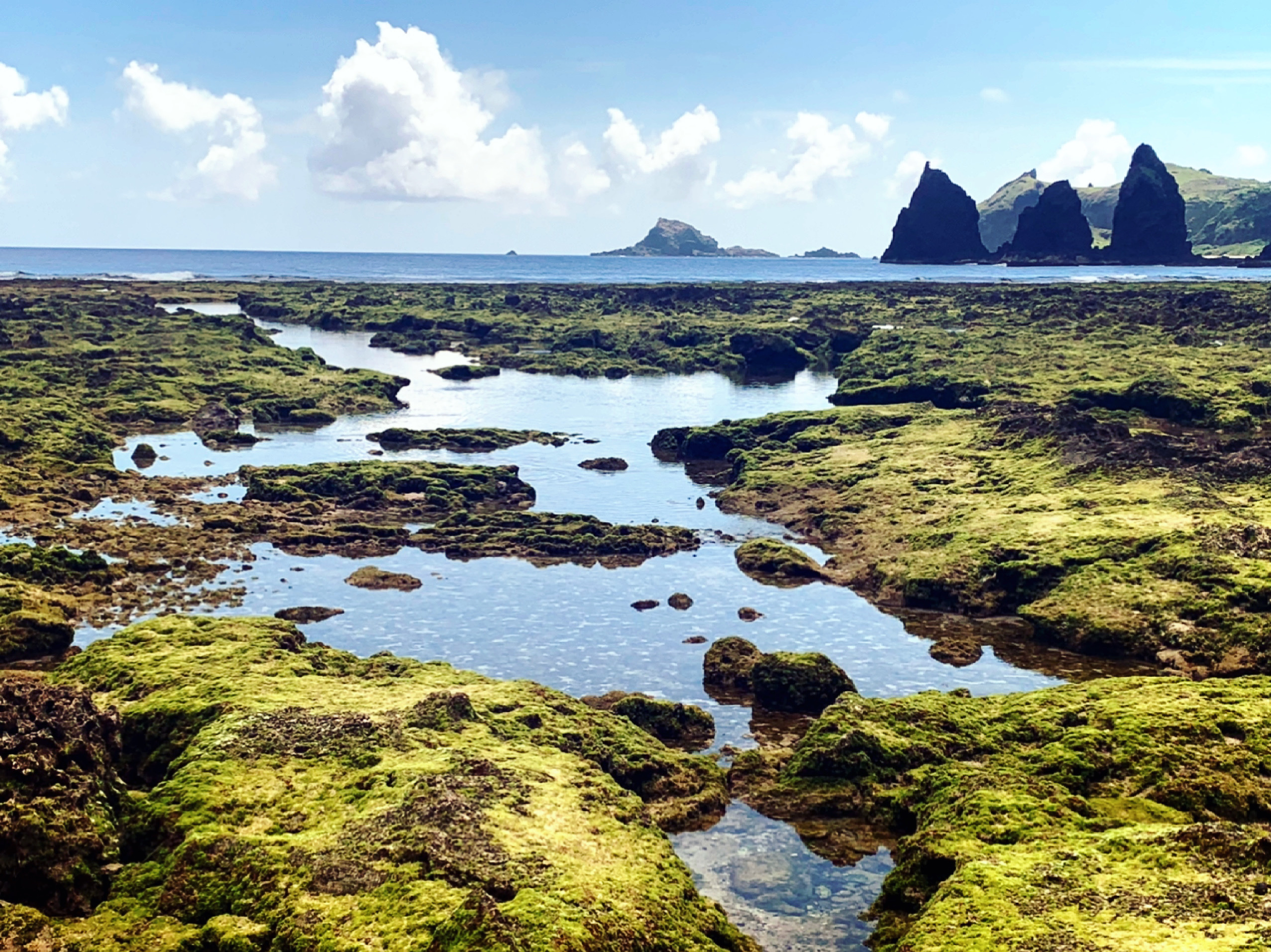
The Three Sisters on Green Island: it was said that when inmates reached shore and saw the Three Sisters, walking under the natural stone bridge near them, that they would know where they were going: the infamous political prison. Over time, they have become something of a symbol of the need for transitional justice from the Martial Law era.
Just before the pandemic came to Taiwan for real, I was lucky enough to have taken a weeklong vacation to the East Rift Valley, Taitung City and Green Island. Because everything else is doomsday news about the escalating case numbers, I thought a peaceful retreat into one of the most beautiful parts of Ilha Formosa was in order, to calm ourselves and think of days ahead.
I don't post about every trip in Taiwan, because I don't always have something to say (what more is there to cover from yet another weekend getaway to Tainan?). But when I do, I try to focus on a particular thing -- usually history, geography, old houses, or itineraries.
This time, my only real focus is on just how hard the KMT sucks, because Green Island is home to their infamous White Terror-era political prison.
In a future post, I'll offer up more photos with an emphasis on food and cafe recommendations for the southern portion of the East Rift Valley -- stay tuned.
So, please enjoy. I hope these will transport you away from your worries for a moment:
While on Green Island, we stayed at Waiting Here B&B. It's in a funky little house off the main road sandwiched between what looks to be a fancier (but not open) hotel, and a banquet-style restaurant for local tour groups. Some rooms have no windows, but they're decorated in a kitschy retro style. Ours was a "no window" room but indeed there was one window; it was high on the wall and afforded little light. However, this helps to keep the rooms cool and I didn't mind. They have a friendly dog named Shu-fen and the owners are lovely people. There are seats and a water machine with coffee, tea and candies in the common room and a refrigerator for guests' use on the 2nd floor. There's an additional, very reasonable fee for breakfast, which is always a unique combination. I liked it!
The owners can help you rent a car if you don't want to rent scooters, and will meet you at the airport or ferry terminal where you can also pick up or drop off your vehicle.
Though the B&B itself has no view, it's right by the sea wall. Walk up the sea wall steps. Bring your morning coffee, but do this before 8am by which time it's too hot -- and enjoy your breakfast drink of choice with a sweeping view of the Three Sisters (the cover photo for this post).
The guesthouse with the best view is probably Green #32 Houses, but we didn't stay here, so I can't review it. It's not near town, so you'd have to drive to get just about anywhere.
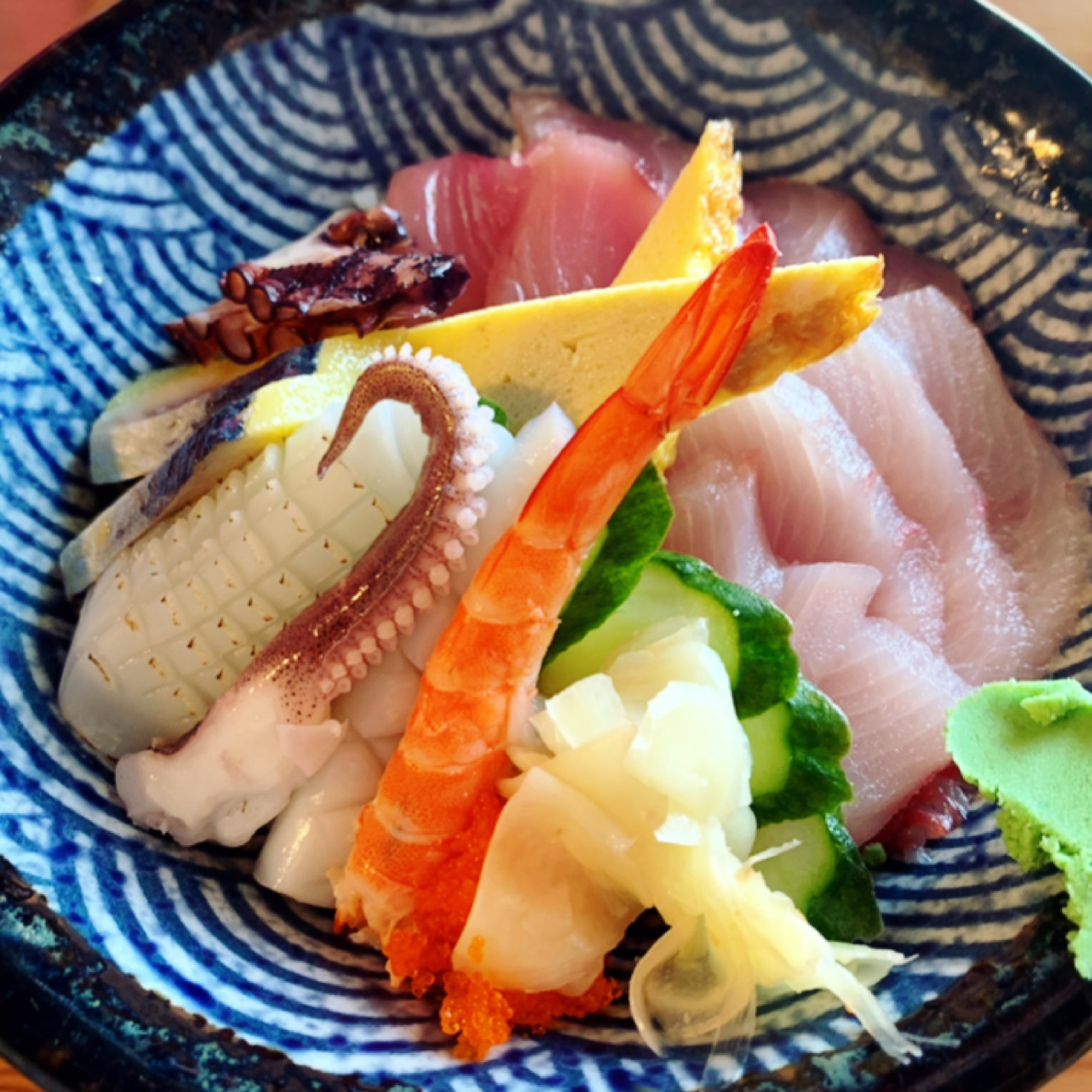
We also liked maunmaun 漫漫, hidden down a path from past some construction from the main road -- it's impossible to see from the road, you'll simply have to park and walk, and the sign pointing to the correct path is easy to miss. They have great fresh fruit smoothies, creative cocktails, an artsy-youth oasis in the jungle vibe, and good food (although only the green curry was available when we went). Nearby, you can grab a snack at SeeSea Toast, which has a friendly cat and sea views on the top floor. Our preferred cafe is right next to the airport, and is connected to a hostel (you don't have to stay at the hostel to stop at the cafe).
What else is there to do on Green Island? Mostly drive around and look at scenery. The Taiwan-facing side of the island is developed, and the open ocean side is the 'scenic' side, offering many viewpoints where you can stop and enjoy the volcanic rock formations, cliffs and vast ocean scenes. In particular, the scenery around the prison, the two pagodas at the "Little Great Wall" (emphasis on "little") are worth your time, as is the viewing platform and grassy field above Zhaori Hot Springs (closed for renovation when we visited, but friends speak well of them), Youzihu 柚子湖 and the road that leads to the Sika Deer Ecological Park. The park itself was closed when we visited, but the road affords some lovely views. The area around Dabaisha 大白沙 is also stunning. Guanyin Cave isn't much on its own, although it is a good place to stop for some shade, bathrooms and cool drinks. Butterflies and lizards abound here, and there's also a gift shop.
In fact, there are clean public bathrooms scattered along the circular island road, so you're never too far from one.
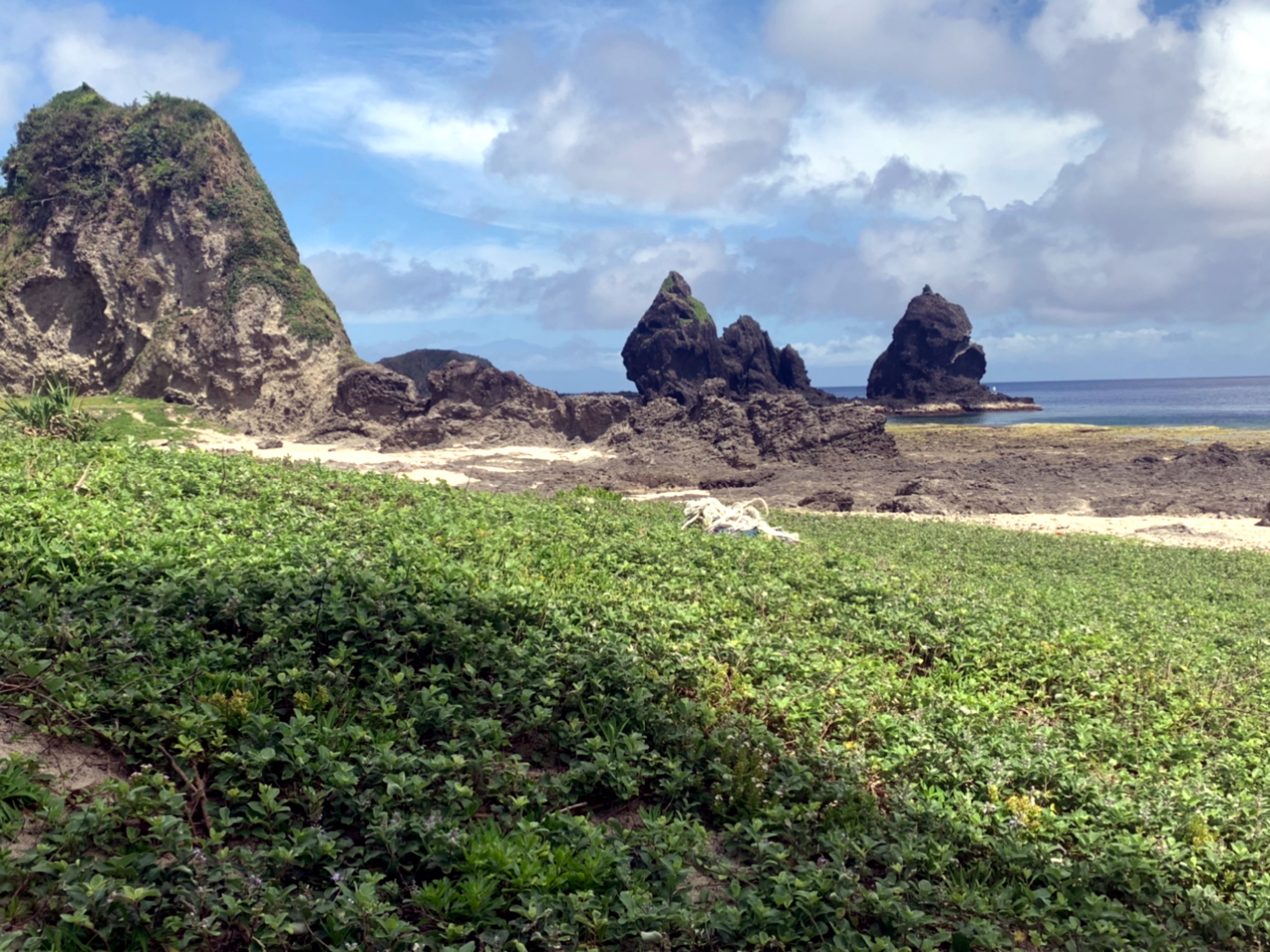
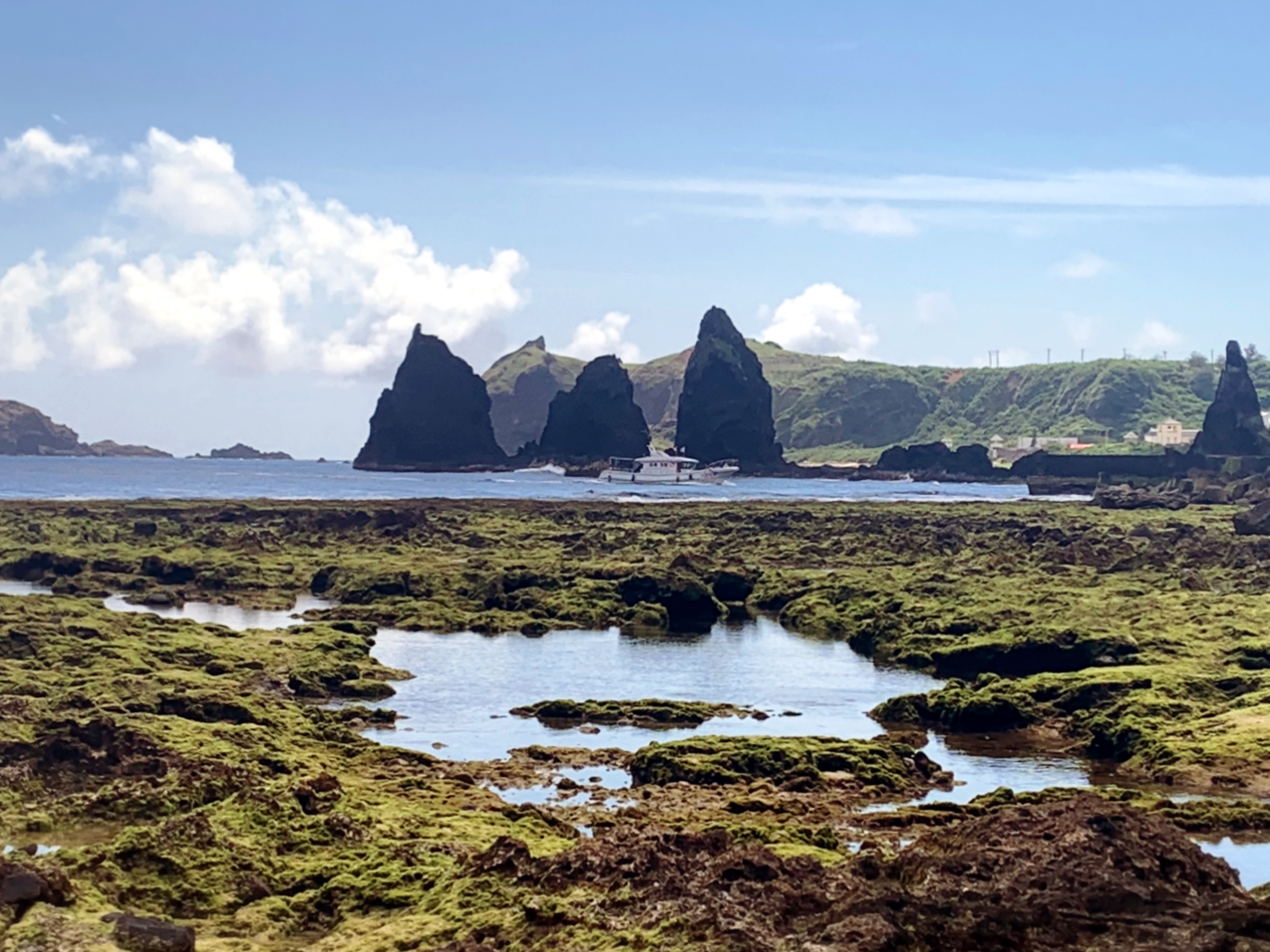


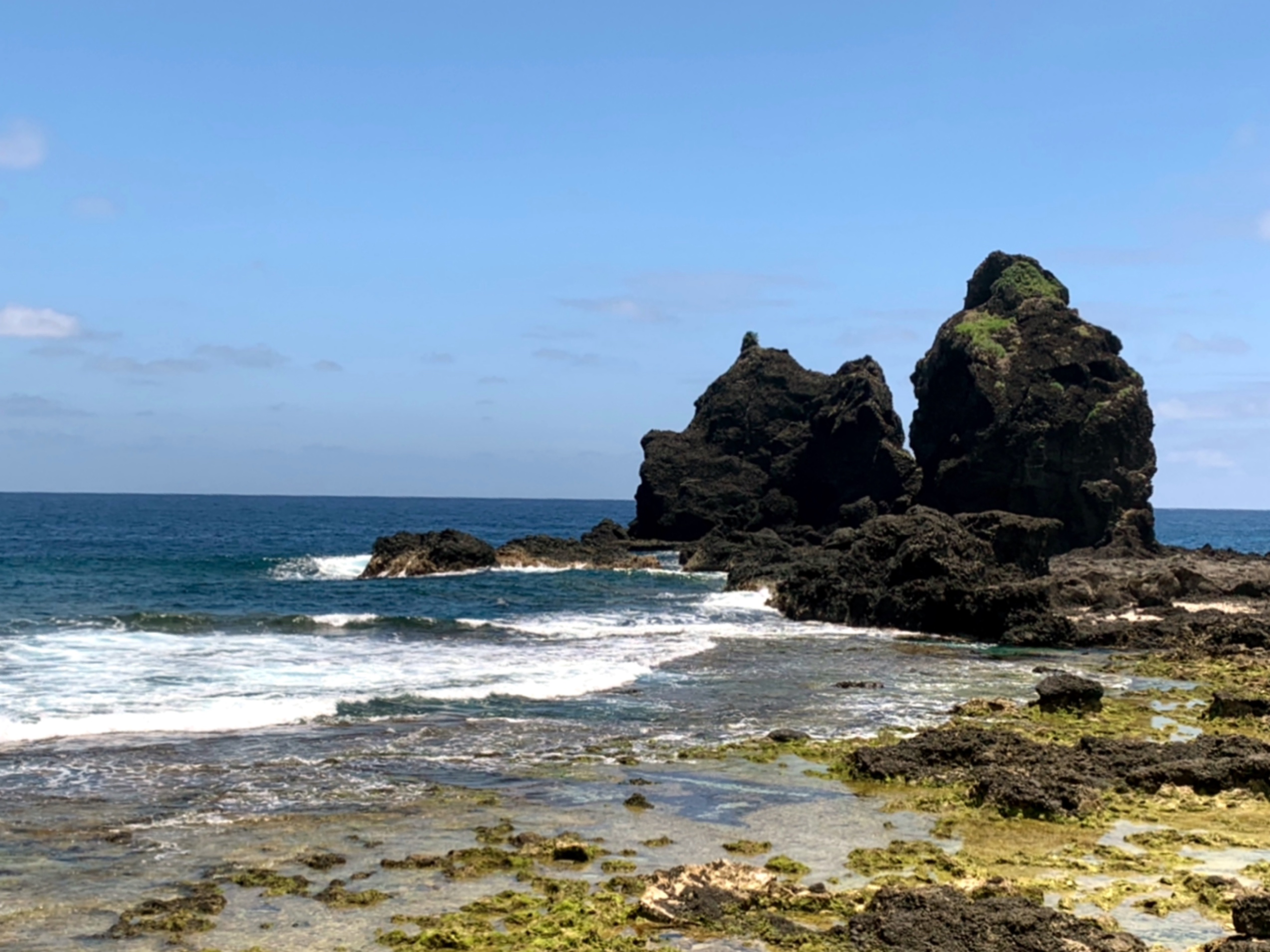
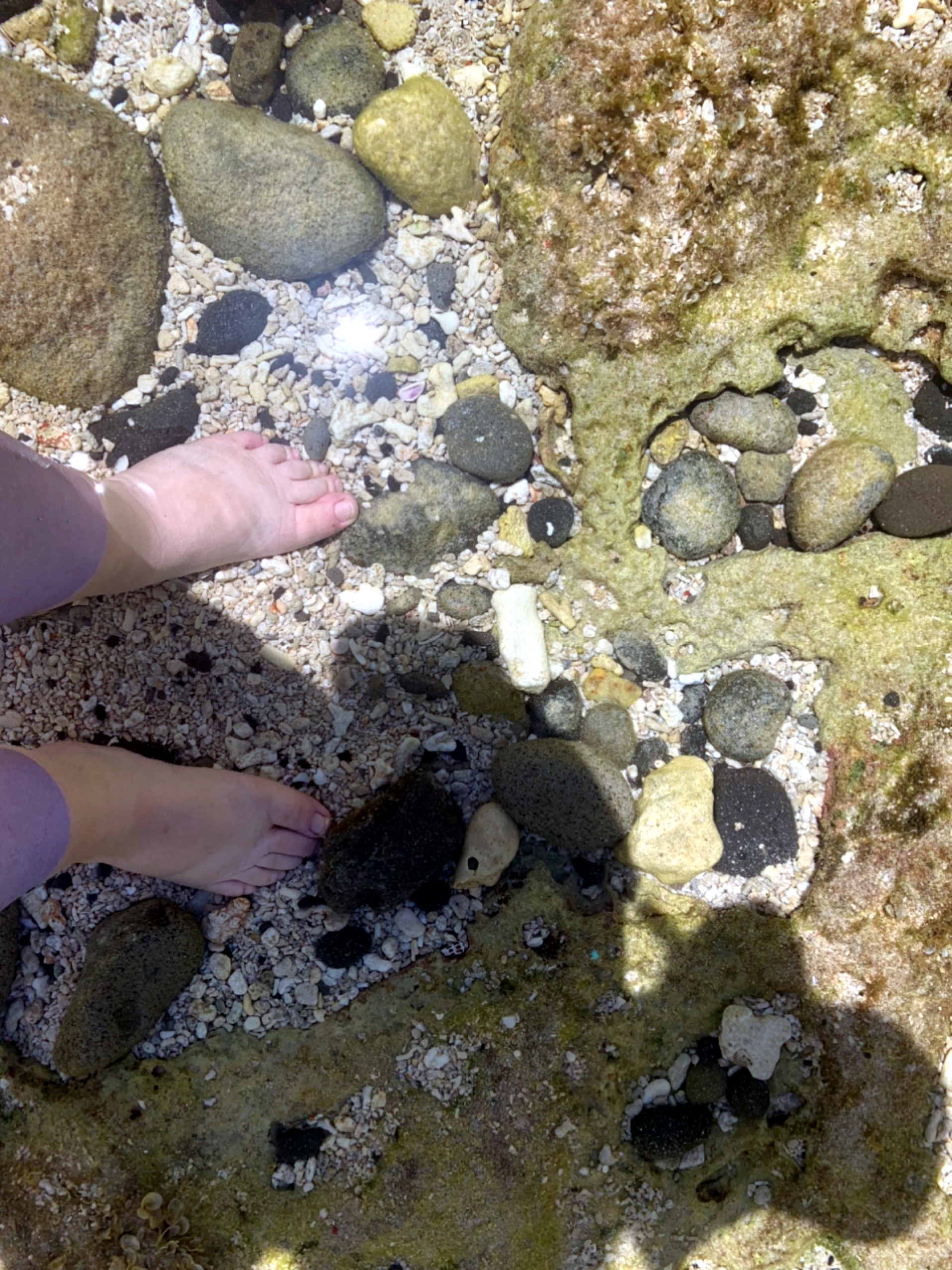
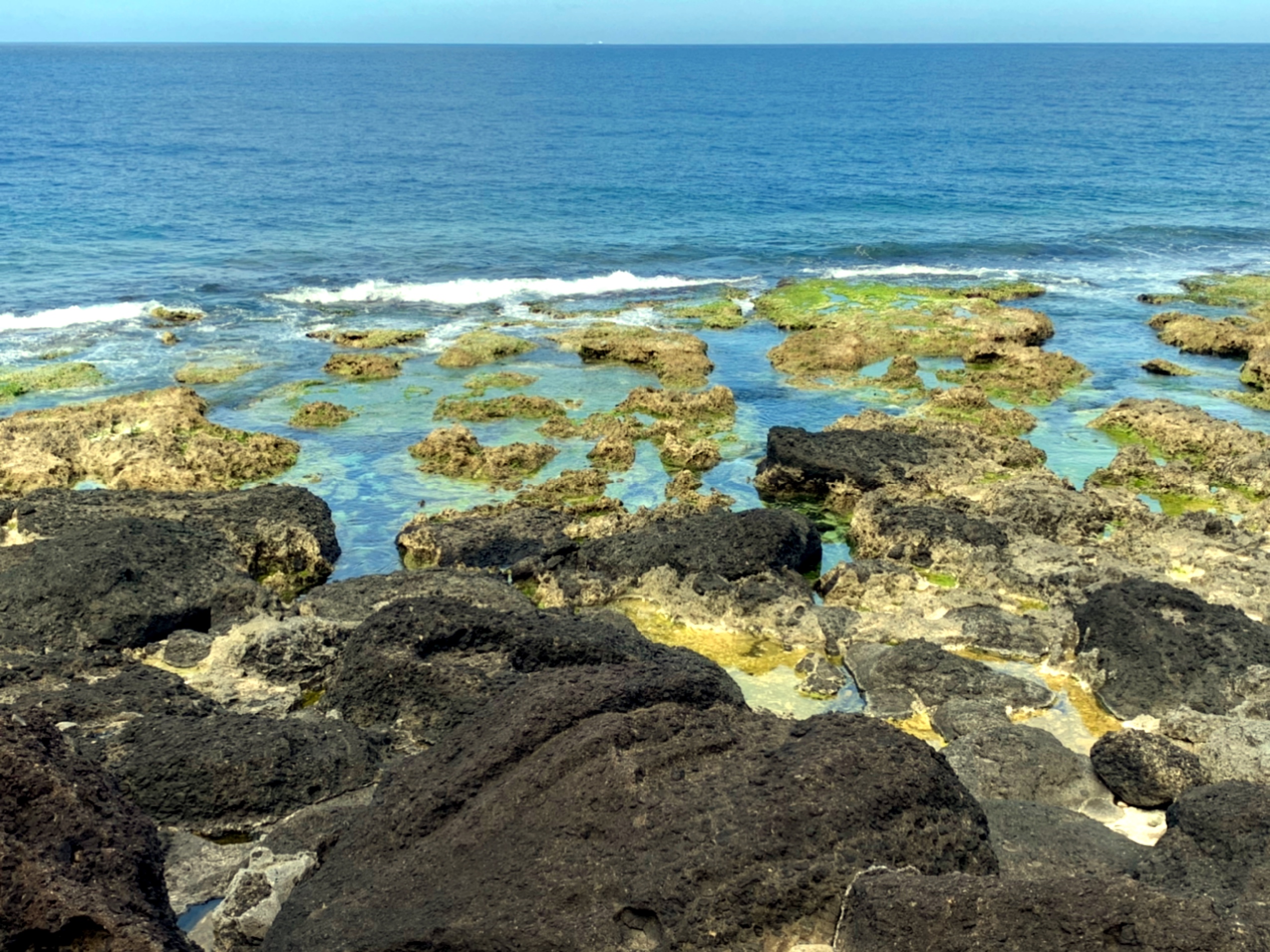
There is a cool story about a shipwreck on Green Island that I'd like to tell you here.
In 1937, the SS President Hoover was diverted from Hong Kong to Shanghai to evacuate US nationals living there during the Sino-Japanese war. Despite draping a massive US flag draped across the deck to identify to both sides that they were a neutral US ship (they were at war with neither side as of 1937), the ROC air force mistook them for a Japanese ship and bombed them, wounding 8 and killing 1. The ship aborted the mission and returned to San Francisco for repairs. The Americans were evacuated by other ships, as this Transatlantic Accent Guy will tell you.
Wondering who could be so stupid as to bomb the President Hoover, Chiang Kai-shek vowed to execute whomever had given the order. Apparently, this wasn't because it was a US ship so much as that it was owned by Dollar Lines, and Chiang had known Robert Dollar. This was strictly a "you hurt my dead rich friend's toy, and I am also rich!" sort of anger.
Robert Dollar, by the way, not only seems like he looked and acted just like a robber baron, but here's a quote for you:
He travelled himself all over the Orient, seeking products to take back to the US in empty timber ships. In doing so, he made friends with all the key people in business and politics. One observer said that the ordinary people of China idolised him and that on one of his trips a three hour procession of thousands of men and women passed by his hotel to honour him! “A power in his own land, he was all but a god in the Orient”.
Anyway, it turned out that the person who gave the order was Claire Lee Chennault, who had been hired by Chiang's wife Soong Mei-ling just months prior. So, instead he paid him a bonus! My opinion of Soong is highly unfavorable, but instead of harping on how bad she was for Taiwan, let's take a look at how unqualified Chennault was instead:
Poor health (deafness and chronic bronchitis), disputes with superiors, and the fact that he was passed over as unqualified for promotion led Chennault to resign from the military on April 30, 1937; he separated from the service at the rank of major. As a civilian, he was recruited to go to China and join a small group of American civilians training Chinese airmen.
It seems he got a little better at his job later on, but at this point he was basically a dude who bumbled into his job and mucked it up. But "well, my wife hired you, so here's ten thousand dollars" was just how Chiang rolled. Seriously: instead of executing him, Chiang paid Chennault a $10,000 bonus. That was 10 months' worth of his regular salary!
Anyone who thinks a guy like Chiang was a brilliant military strategist against the Communists is sorely mistaken.
Anyway, the President Hoover returned to Asia and was headed to Manila for business reasons later that year. Due to the Sino-Japanese War, they avoided the Taiwan Strait and coast of China, instead sailing down the unfamiliar east coast of Taiwan.
There was a heavy mist and monsoon wind, and the Japanese had turned off the lighthouses due to the war. The Hoover struck a reef about 500 meters off Chungliao Bay (where the main town is located). Attempts to right the ship and get people to shore included offloading cargo -- but the cargo was oil, so that just covered the beaches in oil. Great thinking, Captain Yardley!
Reports are that two lifeboats capsized more or less due to the incompetence of the crew. Nobody died, but many passengers suffered from hypothermia.
Fortunately, the US and Japan were not at war yet, so the Japanese and local villagers assisted the evacuating Americans (a German ship was also nearby but couldn't get close enough). While this was happening, please enjoy this little tidbit from Wikipedia:
According to Time, while the passengers were being taken ashore a small number of the crewmen aboard President Hoover plundered the ship's liquor supply.According to Dr. Claude Conrad, a missionary official of Washington, D. C.: "A majority of the ship's crew came into camp more or less incapacitated and abusive from the effects of free indulgence in the ship's liquor stores. Out of control of officers partially in the same condition, many of the crew men continued most of the night terrorizing passengers and natives." However, when the liquored seamen began hunting for women passengers sleeping in scattered houses ashore, some officers and other passengers formed a vigilante group to protect them. There was no actual molestation. There would have been no disturbance at all ashore, said some of the passengers, if the Hoover's officers had been permitted by Japanese police to land with their guns."Other witnesses reported that some of the passengers also got drunk.
Anyway, the passengers were evacuated, the ship was torn up for scrap and by the time it had been fully broken down, Dollar Lines had ceased to exist.


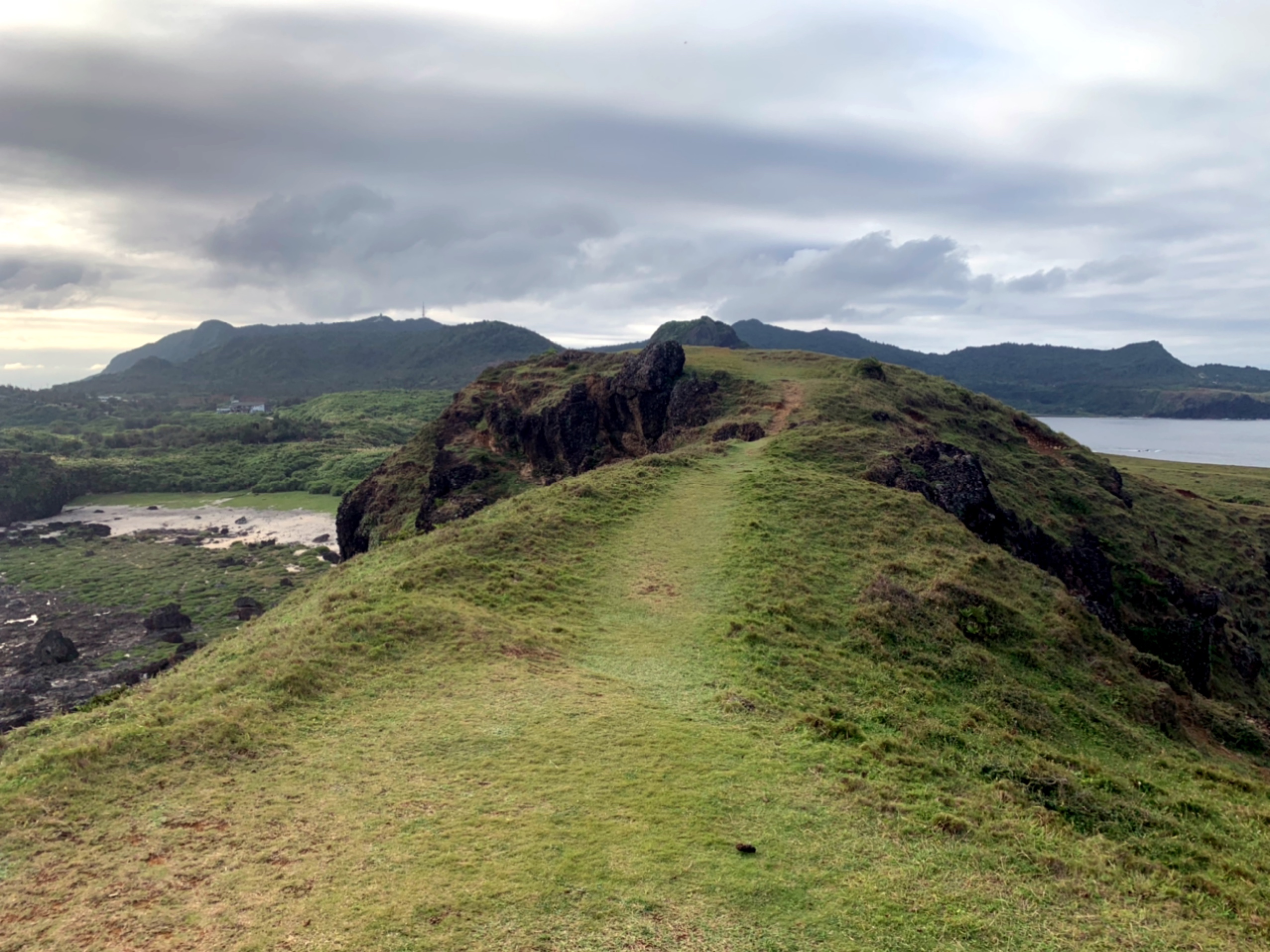

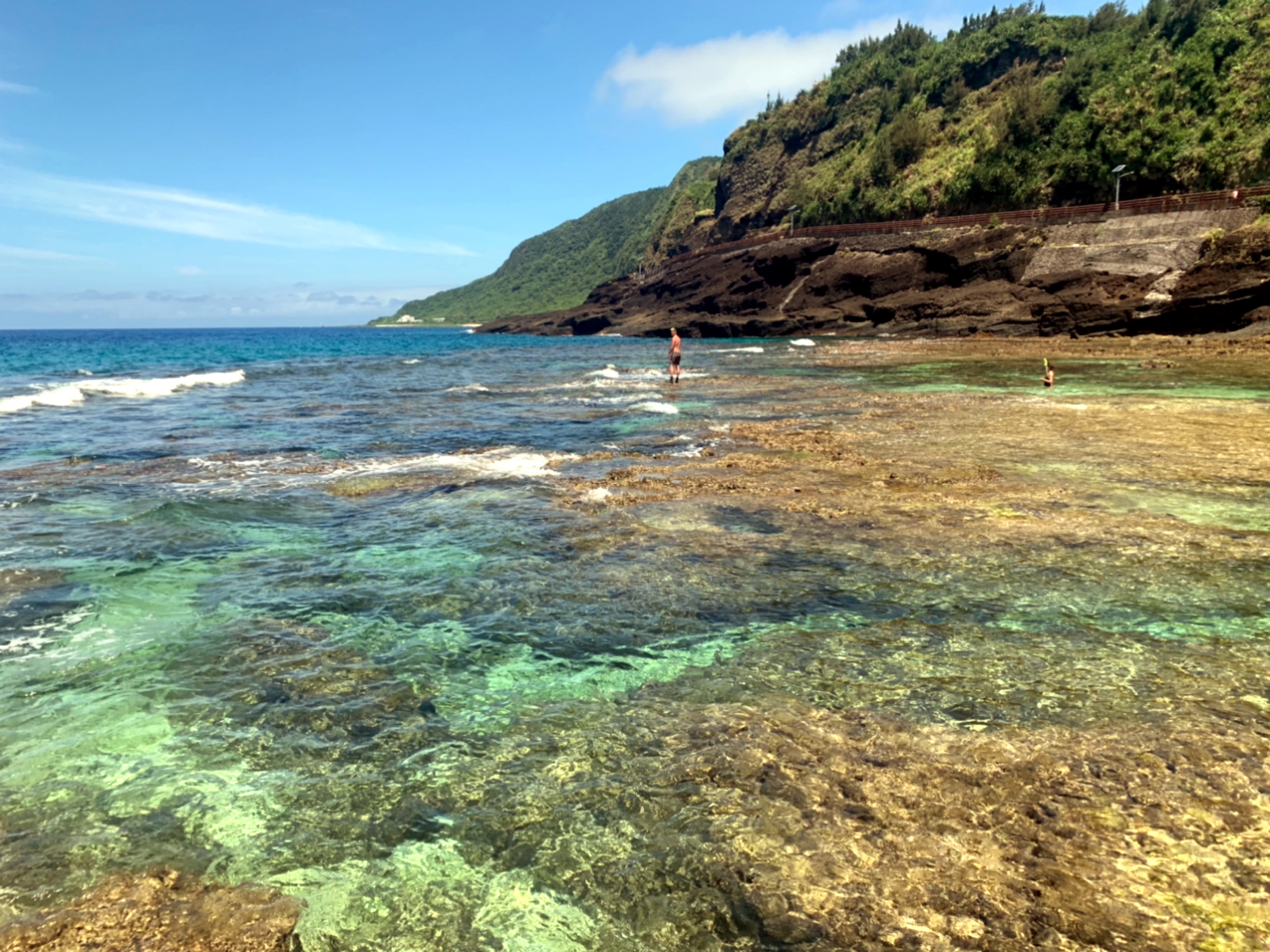
Other popular Green Island activities include snorkeling or diving, which you are advised to do in groups, as the waters are treacherous and the currents deadly. We didn't go on any of these excursions, as I'm used to snorkeling in calm waters in Southeast Asia on my own. The last time I tried in Taiwan, on Orchid Island, I got seasick from the choppy waves and a fellow snorkeler kept whacking me in the face with her fin, oblivious to my attempts to get her attention. I was happy to give it a miss this time.
Overall, I prefer Orchid Island for its scenery, size and unique local culture. I haven't been in almost a decade but when I visited, there was far less tourist infrastructure than Green Island. That's probably changed, but I hope not too much (even as I admit I am just such a tourist).
It is a shame, however, that Green Island was also once home to Indigenous people: a group of Amis, who called the island Samasana. By the time the Japanese came to Taiwan, however, reports are that the island was entirely Han. How many Amis were massacred and how many married into Han families? I have no idea.
However, Green Island boasts one thing Orchid Island does not: no, not the political prison, though it has that too. We'll get to that in a moment.
It offers safe places to get in the water, even if you aren't going snorkeling.
At Dabaisha, if you arrive at high tide (this can be Googled), the water just about touches the rough white sand. There are flat sandstone boulders at the surf line, as well, and you can sit on these and enjoy the ocean safely. There's also a walk out to the edge of the shallows where you can stick your feet in regardless of the tide. It washes over a little at high tide, however. In low tide, pools of clear water to one side of the walk can be snorkeled without a guide, but you'd need your own equipment (no fins necessary). I do not recommend actually attempting to swim at high tide, as the currents are worse than ever.
You can also get in the water at Youzihu, which is down a winding road off the main circular road (there is parking, but it's quite rough). Here, a natural inlet allows ocean water to come into a shallow, rocky pool but protects you from the deadly currents. It isn't very deep, but you can feel like you've actually reached the sea.
I also hear there are shallows at the lighthouse, but we didn't make it there.

Now, it's time to talk about the prison.
Just north of the main town, near the Three Sisters, the prison is free to visitors and pamphlets in a number of languages are available. There's a small shop just beyond, mostly selling books. It's now a human rights memorial and pulls no punches in clarifying how horrible -- how unforgivably vicious, cruel and authoritarian -- the KMT were.
The "Oasis Villa" and "New Life Correction Center" -- named as a form of doublespeak to make it sound like the political inmates jailed there were oh-so-benevolently cared for by the KMT dictatorship, helped to re-shape their thinking and put them on the "correct" path to a better life as a docile supplicant to their brutal regime -- are infamous in Taiwanese political history and older activist circles.
After arriving on Green Island, prisoners were not only subject to brainwashing sessions (and surrounded with pro-ROC political slogans), but routinely tortured. Stories abound of the "Great Wall" (not the same as the "Little Great Wall" viewing platforms mentioned earlier), a series of coral-stone squats that prisoners had to build for themselves, "water cells" at the sea line where chained prisoners suffered under the sun at low tide, skin burning and cracking, and then could barely lift their heads out of the water enough to breathe at high tide. One torture, called "ants on a tree", had guards pouring sweet syrup over inmates so that ants would swarm over them. They were pushed into forced labor and "voluntarily" received tattoos of anti-communist slogans.
Although a robust black market grew and prisoners traded everything from cigarettes to writing materials, many were not allowed to talk freely during the brief exercise time they were allotted twice a day.
Cells ranged in size -- we guessed the larger ones were likely for sharing -- and quality. The prison had many solitary confinement cells which some prisoners found themselves in for years at a time. Many of these were padded, used for prisoners that the regime felt would attempt suicide by bashing their heads against the wall. Such cells had almost no natural light.
In the fictional novel Green Island, this is the kind of cell that the protagonist's father spent ten years in.
The prison was in operation until the end of the White Terror, and was the site where writer Bo Yang was held. The Malaysian guide I met at the Jingmei Human Rights Museum is also mentioned in the informational placards.
It is no exaggeration to say that there was probably not a single person imprisoned here who deserved to be (not that I think anyone deserves that kind of treatment, but most were political prisoners who, in a just world, would not have been punished in any way).

This is the kind of Chiang Kai-shek bust that can and should stay where it is: it's at the entrance to an old prison block, and serves as a historical reminder. Chiang Kai-shek Memorial Hall on the other hand? Time to remove his statue and re-purpose the space for something better suited to the needs of a democratic nation free of his literal reign of terror.
First, to anyone who makes the argument that we need to keep statues honoring Chiang Kai-shek around, or that the China-centric names of Taipei streets should remain "so we can remember history" or "to avoid erasing the past":
Fuck you.
There are many ways to remember the past. Books are good. Preserving historical sites -- not honorary statues or hagiographic "memorial halls" -- are also a good way to accomplish this.
Anyone who visits this prison, the Jingmei Human Rights Museum, the 228 Museum, the statue park and tomb of Chiang Kai-shek at Cihhu, the old execution ground at Machangding, or any of the other numerous sites where the horrors of Taiwan's past can be remembered, can see that you don't need a statue honoring a soulless power-hungry mass murderer that his surviving victims and their descendants have to look at on, say, their commute to work to remember the past.
You have all of these actual historical sites for that. They are informative, they are imbued with sadness, and they ground you in the real places where these events happen.
Not only is nobody suggesting we do away with these, the intent is to preserve them, so as not to erase history. And by doing so, we ensure that we don't need some goddamn statue of a goddamn massacre-happy maniac in the middle of goddamn Taipei to do it.
You know this, and yet you make your disingenous bullshit arguments again and again and again and again. You keep making them as though repetition will breathe sense into them. It will not.
It's almost like you don't actually care about "not erasing history". You just want to...I dunno. Score points? Stall change? Whitewash history by twisting an argument about 'historical preservation' around to defend a statue meant to honor a butcher and destroyer of human lives?
Your argument is bad, and you should feel bad.
Back to the prison.
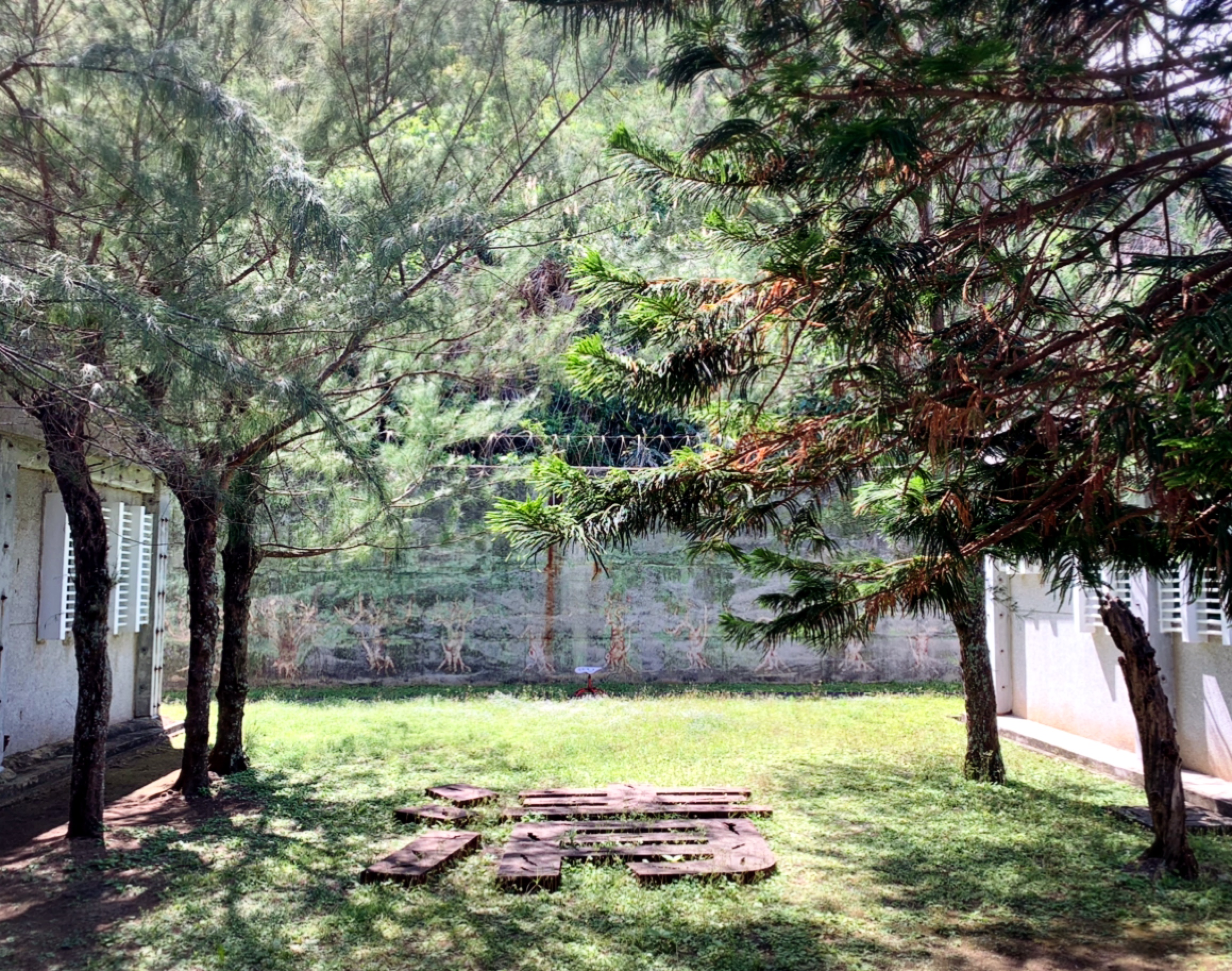
The second thing I came away with was a renewed sense of just how impossible it is to ever truly forgive the KMT for their history.
I often hear the argument that what they did was "in the past". They're a party competing in a democratic system now, and the White Terror is over. The government apologized (which Lee Teng-hui did do, at least on behalf of the government, though I can't find evidence that he specifically apologized on behalf of the KMT as a party). Let it go, these voices seem to say. Move on.
I'm not Taiwanese. My ancestors barely survived a genocide that the government of their homeland still refuses to recognize, however, so I understand why burying the hatchet is not so easy. I completely empathize with the victims and their descendants refusing to bow down to those who want them to forget their history because it is inconvenient to some.
But the KMT remains corrupt. They continue to attempt to undermine the core Taiwanese belief that Taiwanese identity, history and heritage are very real and quite distinct from China. They fight transitional justice at every turn despite insisting they will confront history "honestly". They're slow to open records. They try to keep money they stole generations ago by plundering Taiwan's resources and diverting it all to their pockets or patronage networks.
And they still let their members get away with saying White Terror-reminiscent crap like allowing one of their city councilors to call for Health Minister Chen Shih-chung to be executed.
I see no reason at all to forgive them. I won't, and if I had family affected by their actions, I certainly wouldn't. As far as I'm concerned, the only just path forward is for them to become so unpopular as to be rendered irrelevant in Taiwanese politics, and for new, better opposition to the DPP to take their place, preferably in a more multi-party environment.
In other words, their history is so brutally unforgivable that I think it would be better if the KMT simply ceased to exist as a political entity. There is nothing they could possibly do to come back from their past. They committed these atrocities, and they knew what they were doing.

There is more to say about the prison itself: the "defeat the communists, reclaim the mainland" graffiti, the murals, the Bagua Building, the art installations that evoke memory through creative expression. The many placards (all in English) about the history and inmates there.
You also get a sense of why the prison was on Green Island at all. Think about the choppy boat ride most people take to get there from the Taiwan mainland. Could you imagine trying to swim that and surviving?
However, I recommend that you go see it for yourself.
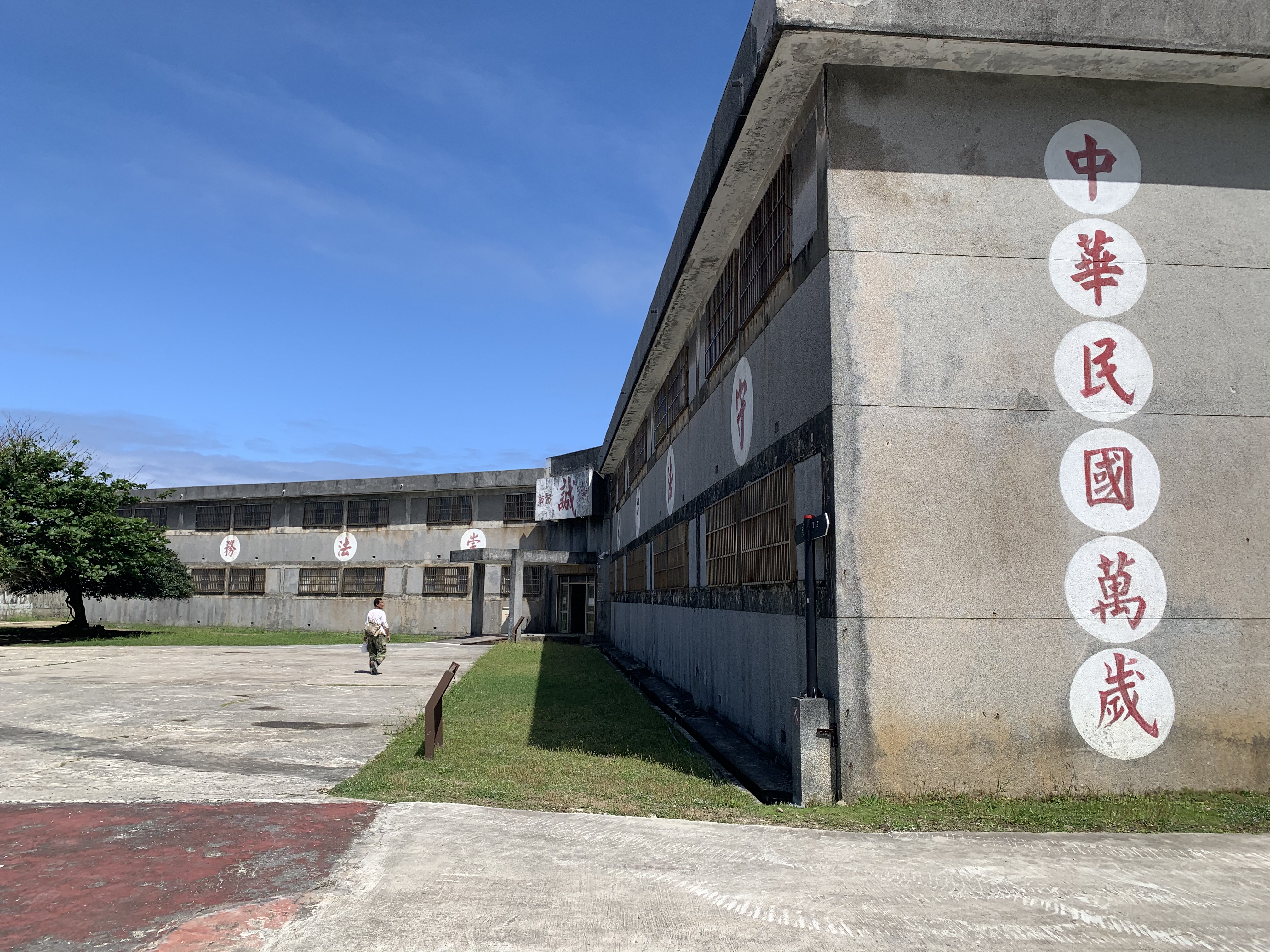

People and cultures process trauma in different ways, including using humor, so I'm not going to pass judgment on this. But I skipped these establishments.

One might land on Green Island and immediately turn their nose up at how touristy it is. And it is! Almost all of the businesses on the island are geared towards tourism. Every third storefront is a dive shop or restaurant for tour groups.
But here's the thing: this isn't for foreign backpacker crowds, though some foreigners do come. Taiwanese built this tourism infrastructure for themselves. Most of the tourists there are local, not foreign. This isn't like a Thai island. This isn't Palau (though I've heard it jokingly referred to as "Budget Palau"). It doesn't seem to have the same foreigner contingent as Kenting.
This is a beautiful part of Taiwan, developed so Taiwanese could enjoy their own country. Foreigners are welcome as well, but it's not for them.
I like that.
Now, some information.
I strongly recommend you visit Green Island in the shoulder season -- just before or just after summer vacation, when it gets packed. Don't go on a weekend, plan a weekday trip instead. It won't be hard to get accommodation or avoid tourist crowds on, say, a Wednesday in April, May or September. Even though we did just that, however, there were still several tours and diving groups about.
This not only gives you a more chilled-out vacation with less traffic and fewer crowds, but enables business owners on the island to earn more money outside peak season. However, I'd advise aiming for spring rather than fall, as September is still typhoon season and many travelers' Green Island trips have been cancelled for just that reason.
There are two ways to get there: plane and boat. The plane takes about ten minutes, and can be booked in advance through Daily Air. It's a ten-minute flight on a positively tiny craft. It's also prone to cancellation -- our flight was cancelled due to a rainstorm, and we had to take the boat the next day (fortunately it is fairly easy to refund half of a round-trip ticket).
The boat can also be reserved in advance, and most accommodation on Green Island will help you do so. It takes about 50 minutes, and leaves throughout the day. These also get cancelled in rough seas sometimes.
I recommend you hit up a local pharmacy in Taitung and tell them you plan to take the boat to Green Island. They'll give you the strongest anti-seasick pills you've ever had. Mine knocked me right out and I slept through the trip. Although we sailed on fairly smooth waters and it didn't seem as though many people puked, they provide generous barf bags and expats have dubbed it the Green Island Vomit Comet for a reason.
How long you should to spend there depends on what you want to do. If you like just chilling out around great scenery, you could spend days here. If you want to check out the main sights and maybe go diving, one full day or two days will be sufficient.
Either way, I do recommend you go. Just not at peak season.
